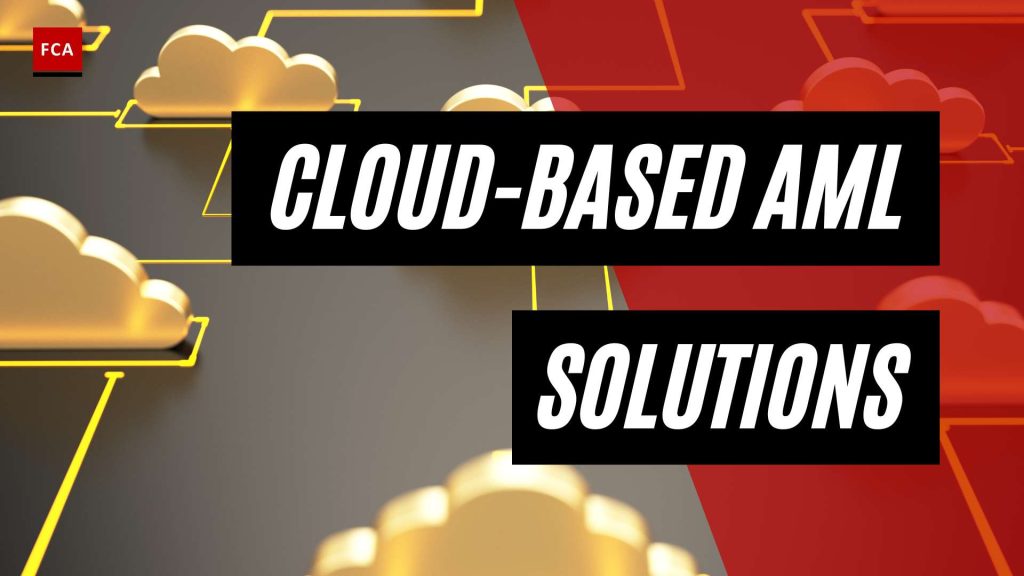Understanding Cloud-Based AML Solutions
As the financial sector continues to evolve, so do the threats associated with financial crime. Traditional anti-money laundering (AML) approaches may no longer suffice, prompting a shift towards innovative solutions. In this context, cloud-based AML solutions have emerged as a game changer, offering a combination of unique services and technology to accelerate business results (Deloitte).
Defining Cloud-Based AML Solutions
Cloud-based AML solutions leverage the power of cloud computing technology to enhance AML efforts. These solutions utilize software as a service (SaaS), infrastructure as a service (IaaS), and platform as a service (PaaS) to improve productivity and reduce IT infrastructure costs for financial institutions.
These solutions cater to the entire AML value chain, including Know Your Customer (KYC), customer screening, transaction monitoring, and regulatory reporting. This comprehensive approach simplifies compliance programs and reduces the cost of errors and inefficiencies found in traditional AML programs.
Benefits of Cloud-Based AML Solutions
Cloud-based AML solutions offer numerous benefits to financial institutions. These include scalability, flexibility, cost-efficiency, and reliability. With the ability to process and analyze large amounts of data in real-time, these solutions reduce the time and resources needed to identify potential money laundering activities.
In addition to processing capabilities, cloud-based AML solutions also offer improved security mechanisms. These include firewalls, encryption, security patches, and multi-factor authentication to safeguard against data breaches, losses, cyberattacks, and unauthorized access. This ensures regulatory compliance and optimizes operational efficiencies.
For small- and mid-size banks, cloud-based AML solutions provide advanced capabilities to automate manual processes, remedial tasks, and enhance data-driven decision-making. This enables them to focus on higher-value analysis and strengthen their compliance programs to adapt to evolving regulatory mandates and combat illicit financial activities (Oracle).
In conclusion, cloud-based AML solutions represent a significant advancement in the fight against financial crime. By leveraging the power of cloud computing, financial institutions can not only enhance their AML efforts but also reduce costs and improve efficiency. For more insights, explore our articles on cloud-based kyc solutions and cloud-based aml data analytics.
Cloud Computing in Financial Services
Cloud computing is increasingly becoming a game-changer in the financial services sector. As financial institutions strive to maintain security, reduce costs, and improve efficiency, cloud computing presents a viable solution. This is especially true when it comes to detecting fraud and reducing data storage costs.
Fraud Detection and Cloud Computing
One of the key areas where cloud computing is making a significant impact is in the detection of fraud. Financial institutions are leveraging cloud-based AML solutions to analyze massive amounts of data from diverse sources. This enables them to detect potentially suspicious or dangerous activities and address them proactively.
Cloud-based anti-money laundering (AML) solutions cater to the entire AML value chain, including Know Your Customer (KYC), customer screening, transaction monitoring, and regulatory reporting. This holistic approach simplifies compliance programs and reduces the cost of errors and inefficiencies found in traditional AML programs.
It’s also worth noting that cloud-based AML solutions can accelerate business results by integrating leading technology with proven business acumen. This results in complete, scalable, and bespoke solutions that can transform AML compliance practices. To dive deeper into the role of cloud computing in fraud detection, you can refer to our article on cloud-based aml data analytics.
Data Storage and Cost Reduction
Another advantage of cloud computing in AML compliance is the significant reduction in data storage costs. Instead of deploying and maintaining large on-premise systems, financial institutions can leverage the pay-as-you-go pricing model offered by cloud providers. This eliminates significant upfront costs and allows for greater flexibility in managing storage needs.
Moreover, cloud computing providers ensure tight security measures by following strict requirements for data privacy and security. This includes offering multiple layers of protection against cyber-attacks and data breaches, thereby keeping customer data secure for financial institutions.
Cloud-based AML solutions utilize software as a service (SaaS), infrastructure as a service (IaaS), and platform as a service (PaaS) to enhance productivity and reduce IT infrastructure costs for financial institutions (Fineksus). For more information about utilizing cloud infrastructure for AML compliance, check out our article on cloud infrastructure for aml compliance.
Ensuring Security with Cloud-Based AML
As more financial institutions transition to cloud-based anti-money laundering (AML) solutions, ensuring robust security measures becomes paramount. These solutions must protect sensitive data, maintain compliance with regulatory standards, and effectively combat financial crime.
Security Measures for Cloud AML Solutions
Cloud-based AML solutions offer advanced security mechanisms including firewalls, encryption, security patches, and multi-factor authentication to safeguard against data breaches, losses, cyberattacks, and unauthorized access. These features are essential for ensuring regulatory compliance and optimizing operational efficiencies.
Furthermore, cloud computing providers follow strict requirements for data privacy and security, offering multiple layers of protection against cyber-attacks and data breaches. These measures keep customer data secure for financial institutions, and allow them to focus on higher-value analysis and strengthen their compliance programs.
It’s important for financial institutions to regularly assess their cloud AML security measures to address the evolving techniques of financial criminals, which may include continuous monitoring, stringent data protection standards, encryption, and multi-factor authentication methods for data access and storage (Fineksus).
Data Privacy and Compliance in Cloud AML
Cloud computing helps financial institutions improve compliance with industry regulations by providing data storage methods that adhere to strict requirements for data privacy and security.
In addition to internal security measures, cloud-based AML solutions must also comply with external data protection laws. Governments worldwide have enacted legislation mandating stringent security measures for cloud-based AML solutions to combat excessive cyber fraud risks, money laundering involvement, and potential cyberattacks faced by businesses for non-compliance.
Cloud security standards are closely tied to data protection laws, such as the General Data Protection Regulation (GDPR) for the European Union and ISO 27001, a globally-recognized information security certification. These standards encompass measures to conceal personal information, withstand cyberattacks, and maintain secure records in the cloud (ComplyAdvantage).
While cloud-based AML solutions offer financial institutions new capabilities in detecting and preventing financial crime, along with greater scalability, flexible pricing, and increased efficiency, firms need to ensure robust security measures to protect against criminal threats to personal data and sensitive information. Noncompliance can lead to becoming complicit with money laundering, cyberattacks, compliance fines, and reputational damage (ComplyAdvantage).
For more information on implementing and securing cloud-based AML solutions, refer to our guide on cloud computing in AML compliance. Additionally, our resources on cloud-based transaction monitoring for AML and cloud computing for AML investigations provide further insights into harnessing cloud technologies for effective AML compliance.
Cloud-Based AML: A Comprehensive Approach
Cloud-based Anti-Money Laundering (AML) solutions have emerged as a comprehensive approach to AML compliance, addressing various aspects of the AML value chain and enhancing security and efficiency in AML programs.
Covering the AML Value Chain
Cloud-based AML solutions cater to the entire AML value chain, including Know Your Customer (KYC), customer screening, transaction monitoring, and regulatory reporting (Oracle). This comprehensive approach simplifies compliance programs, reducing the cost of errors and inefficiencies found in traditional AML programs.
To illustrate, cloud-based solutions offer advanced capabilities to automate manual processes and remedial tasks, enhancing data-driven decision-making. These features enable small- and mid-size banks to focus on higher-value analysis, strengthening their compliance programs to adapt to evolving regulatory mandates and combat illicit financial activities (Oracle).
Cloud-based platforms utilize software as a service (SaaS), infrastructure as a service (IaaS), and platform as a service (PaaS) to enhance productivity and reduce IT infrastructure costs for financial institutions.
Enhancing Security and Efficiency
One of the key benefits of cloud-based AML solutions is the enhanced security mechanisms they offer, including firewalls, encryption, security patches, and multi-factor authentication. These measures safeguard against data breaches, losses, cyberattacks, and unauthorized access, ensuring regulatory compliance and optimizing operational efficiencies (Oracle).
Cloud security standards are closely tied to data protection laws, such as the General Data Protection Regulation (GDPR) for the European Union and ISO 27001, a globally-recognized information security certification. These standards encompass measures to conceal personal information, withstand cyberattacks, and maintain secure records in the cloud.
Apart from robust security measures, business continuity and disaster recovery planning are crucial components of cloud security solutions. Unexpected events like power outages or natural disasters can affect servers and stored data. Implementing disaster recovery plans that minimize downtime, coupled with encrypting and storing backups in controlled environments, are vital for business continuity in cloud systems (ComplyAdvantage).
By covering the entire AML value chain and enhancing security and efficiency, cloud-based AML solutions offer financial institutions a comprehensive approach to AML compliance. For more information about implementing these solutions, refer to our guide on cloud computing in AML compliance. To understand how these solutions can enhance data analysis, check out our article on cloud-based AML data analytics.
Implementing Cloud-Based AML Solutions
Moving towards cloud-based Anti-Money Laundering (AML) solutions is a strategic decision that requires careful planning and execution. Here, we explore best practices for implementation and discuss potential challenges and solutions.
Best Practices for Implementation
One of the key aspects of implementing cloud-based AML solutions is ensuring a smooth setup process. Vendors providing AML solutions should offer ‘plug and play’ capabilities in their software for functions like transaction monitoring and screening. Additionally, offering pre-built libraries of rules and typologies can significantly help clients get started quickly without needing to create everything from scratch.
A personalized approach that caters to individual client needs is essential, especially for managing bespoke rule sets or challenges with data quality. Having a dedicated implementation consultant for each client can ensure continuity of service, a quick response to challenges, and flexibility in working remotely or on-site as needed.
Moreover, RegTech vendors specializing in specific markets like digital banking or payments could offer more tailored solutions for firms in those sectors. Having experience with relevant firms in the client’s space allows for out-of-the-box thinking when addressing challenges and roadblocks, leading to more efficient solutions (ComplyAdvantage).
Challenges and Solutions in Implementation
During the implementation process, firms may face challenges that require an iterative mindset and the ability to adapt to changing risks. Vendors should have a ‘test and iterate’ mindset from the outset, allowing for immediate integration through sandboxing. They should also be agile in responding to new risks by enabling quick adjustments to rules without delays.
A prime example of agility in responding to emerging risks is Lumn, an overseas payments and foreign exchange provider. Lumn reacted swiftly to a sudden increase in COVID-related investment fraud by developing and deploying new rule sets within 48 hours to combat the threat. This proactive approach helped prevent more customers from falling victim to scams, showcasing the importance of agility in responding to emerging risks (ComplyAdvantage).
In conclusion, the implementation of cloud-based AML solutions requires a strategic approach and a clear understanding of both the benefits and challenges involved. For more information on cloud-based AML technologies, visit our articles on cloud computing in AML compliance and cloud infrastructure for AML compliance.
The Future of AML: Cloud Computing
The evolution of technology has brought forth new opportunities for financial institutions to enhance their Anti-Money Laundering (AML) efforts. Notably, cloud computing technology has emerged as a potential solution to address the challenges faced by traditional AML approaches.
Evolving Threats and Cloud AML Solutions
The limitations of traditional AML approaches make it difficult to effectively detect and prevent money laundering activities, prompting the need for more advanced solutions like cloud computing technology. Cloud-based AML solutions offer financial institutions new capabilities in detecting and preventing financial crime, along with greater scalability, flexible pricing, and increased efficiency.
By leveraging cloud computing technology, financial institutions can process and analyze large amounts of data in real-time, reducing the time and resources needed to identify potential money laundering activities. This functionality plays a critical role in combatting the evolving threats of financial crime, making cloud-based AML data analytics a key component in the future of AML compliance.
However, as these threats evolve, so too do the risks associated with data security. Firms must ensure robust security measures to protect against criminal threats to personal data and sensitive information. Noncompliance can lead to becoming complicit with money laundering, cyberattacks, compliance fines, and reputational damage.
The Role of Regulations and Laws
Cloud security standards are closely tied to data protection laws, such as the General Data Protection Regulation (GDPR) for the European Union and ISO 27001, a globally-recognized information security certification. These standards encompass measures to conceal personal information, withstand cyberattacks, and maintain secure records in the cloud.
Common cloud AML security measures mandated by regulators include employee training to meet regulatory obligations and regular evaluation of cloud security solutions. Cloud security certifications, like ISO27001, test the effectiveness of a firm’s cloud security against various threats and drive continuous improvement.
Moreover, business continuity and disaster recovery planning are crucial components of cloud security solutions, as unexpected events like power outages or natural disasters can affect servers and stored data. Implementing disaster recovery plans that minimize downtime, encrypting and storing backups in controlled environments are vital for business continuity in cloud systems.
ComplyAdvantage sets an example for cloud security compliance in AML solutions by providing transparency on safeguarding clients’ data. Their policies balance data protection requirements with global AML regulations, including encryption, certification to ISO27001 standards, compliance with GDPR and other privacy laws.
As we look to the future of AML, the need for cloud-based AML solutions will continue to grow, driven by both the evolving threats of financial crime and the increasing benefits offered by cloud technology. At the same time, the importance of cloud computing for AML professionals to understand and navigate the associated regulations and laws will be paramount.








